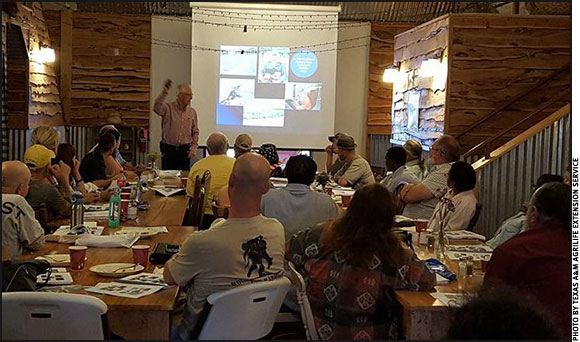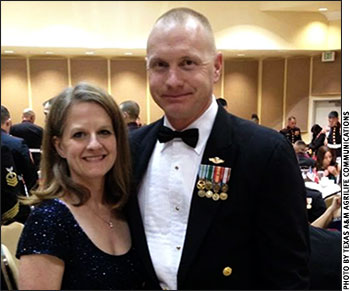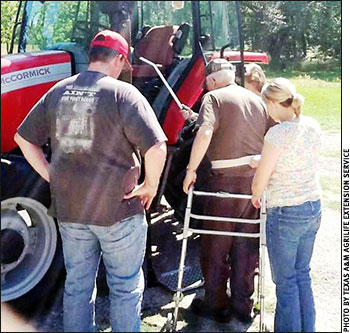
Battleground to Breaking Ground workshops provide information and technical assistance to current and former military service members on funding, planning and resourcing for production agriculture operations.
AgriLife Extension Helping Serve Those Who Served Their Country
Agency programs support military families, caregivers, vets involved in agriculture.
With Veterans Day still on our minds, the Texas A&M AgriLife Extension Service is reminding current and former military that the agency has programs, materials and resources to help improve the quality of life for service members and their families.
Rachel Brauner, program coordinator for the agency’s Texas Military Program, said AgriLife Extension focuses on providing educational programs and resources to assist military veterans, current service members and their families as they face the many uncertainties of military life.
The Texas A&M AgriLife Extension Service has a number of programs, training sessions and educational services benefitting military service members and their families.
She said from 1987 to 2015 the agency and U.S. Army worked in partners hip to meet the needs of Texas soldiers and their family members at Fort Bliss and Fort Hood.
hip to meet the needs of Texas soldiers and their family members at Fort Bliss and Fort Hood.
“More than 50 AgriLife Extension staff located at these installations developed and implemented educational programs to assist over 55,000 soldiers and their family members adapt to a dynamic and changing environment and help meet the emerging needs of our military communities,” she said.
She said areas of assistance included family advocacy, new parent support, substance abuse education, financial readiness, supporting military family members with special needs, mobilization or deployment, relocation and employment readiness.
Brauner said most recently the program began working with Joint Base San Antonio to provide drug and alcohol abuse prevention education programs for military personnel and families, Department of Defense civilians, reserve components and retirees and their family members.
“All educational services and programming is disseminated in a non-clinical format to military personnel and families,” she said.
She said AgriLife Extension also provides support through the Military Families Learning Network — Military Caregiving concentration. This educational network provides professional development opportunities for those who support service providers working with family caregivers.
“Through this network, faculty members with AgriLife Extension and West Virginia University have partnered to provide continuing education and professional development opportunities through online learning platforms, including interactive webinars,” Brauner said. “Research and education play key roles in the future caregiver initiative in order to effectively address the needs of military families and the professionals who serve them.”
For more information on AgriLife Extension’s military program, go to http://military.agrilife.org/ or contact Brauner at 979-458-8871.
For more on military caregiving, go to https://militaryfamilies.extension.org/military-caregiving/.

The Texas AgrAbility program provides assistance to help veterans and others overcome obstacles to working in production agriculture.
“Agriculture is a high-risk occupation, and farmers and ranchers who are injured or disabled, including current or former military members, often have a difficult time remaining in production agriculture,” said Rick Peterson, Texas AgrAbility Program director, College Station. “The goal of this program is to assist, connect and empower producers, their family members and employees with disabilities or chronic health conditions, so they can remain in production agriculture.”
Peterson said Texas AgrAbility has a special interest in addressing the possibilities for ranching or farming by veterans and active-duty military members.
“Texas has the second-largest number of military veterans in the country,” Peterson said. “Additionally, about 45% of returning vets are from rural areas, where the vast majority of agricultural production takes place.”
It’s often difficult for military veterans to find gainful civilian employment after their service, said Erin Pilosi-Kimbrough, Texas AgrAbility’s military workshop coordinator, College Station, who presents programs statewide.
“Through free Battleground to Breaking Ground programs held throughout the state, we connect current and former military members involved in agriculture with service providers who can assist them through training and technical assistance,” she said. “The workshops provide information on funding, business plan development, resource networking and more.”
Peterson said some of the assistive technology available to current and former military farmers and ranchers may include uniquely designed tools and equipment, wheelchair lifts for trucks and tractors, modified all-terrain vehicles, special wheelchairs with action tracks for rough terrain, motion-sensing solar-powered gates and other specially adapted machinery.
“We estimate that we have served about 700 individuals through our Battleground to Breaking Ground workshops,” said Makenzie McLaurin, Texas AgrAbility program coordinator, College Station. “Of those, about 500 have been active-duty or veteran military.”
For more information, go to http://txagrability.tamu.edu or call 979-845-3727.
Peterson also noted he and Cheryl Grenwelge, AgriLife Extension program specialist in disability transition, College Station, will be leading the new Beginning Farmer and Rancher Entrepreneurial Training Project. The project has been developed by AgriLife Extension and various collaborating institutions and organizations “to increase the number and enhance the sustainability of veterans and other beginning farmers and ranchers.”
He said the new project is intended to be a holistic model that will provide education, training, technical assistance and outreach to reduce the barriers to agricultural self-employment by military veterans and beginning farmers or ranchers, especially those with disabilities.
“It will include face-to-face and online educational training, individualized educational planning to support diverse agricultural business interests, hands-on learning opportunities and follow-up mentor support learning opportunities,” Peterson said. “There will also be peer-to-peer learning through an online community of practice, as well as a number of transitional and disability support services.”







